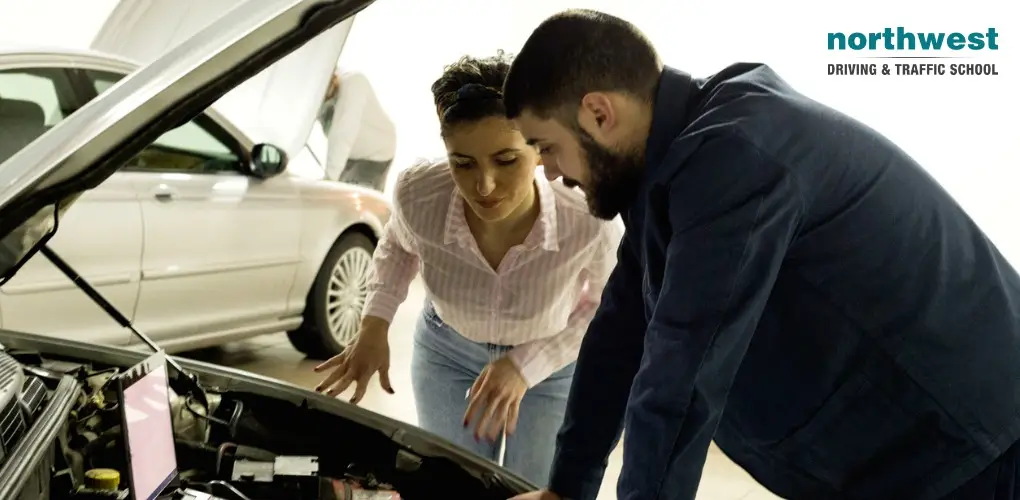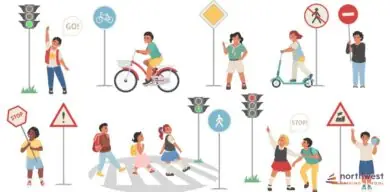- Traffic School
5 Mistakes A New Driver Should Avoid

Starting to drive can be both exciting and a little bit scary. There are so many things to think about and remember while you’re behind the wheel. To help ease your mind (and avoid costly mistakes), we’ve compiled a list of 5 things every new driver should avoid. Read on for more!
Read More: The Top Five New Driver Problems And How To Avoid Them
Table of Contents
Not Learning The Basics Of Car Maintenance
Not learning the basics of car maintenance can be a serious mistake. Even if you are not a ‘mechanic’, understanding and performing simple maintenance tasks can make all the difference when it comes to keeping your car in good shape.
Regularly checking fluid levels, refilling coolant and oil as necessary, airing up tires, changing air filters, and cleaning windshield wiper blades are just a few of the things that should be done on a regular basis to ensure your car is running smoothly.
When problems do arise with your vehicle, having some basic knowledge can help diagnose issues right away so that they don’t escalate into major repairs down the line.
Knowing how to change a tire or check for worn-out brake lines can also come in handy in an emergency roadside situation. In short, taking the time to learn basic car maintenance isn’t difficult, and it doesn’t take much effort – but it could save you thousands of dollars in the long run.
Don’t neglect your vehicle; do yourself (and your wallet) a favor by brushing up on essential automotive skills today.
Not Getting To Know Your Car’s Features And Capabilities
It’s easy to get complacent with your car, ignoring its capabilities and features simply because it still gets you from A to B. But being unaware of your car’s features and how to use them can be costly – or even dangerous in certain situations.
Skipping out on getting a basic understanding of the functions of your car is not only irresponsible but impractical, too. Your car most likely came with an owner’s manual when you purchased it, which contains a wealth of information, including descriptions of all the features and their proper uses – which can be accessed at any time.
Also, if you face an emergency situation while driving, such as a tire blowout or engine trouble, having an understanding of the safety features within can help keep you safe during a dangerous situation.
Knowing the limits and boundaries of your car is especially important for preventative maintenance so that you don’t spend hundreds more than needed due to repairs caused by ignorance. So take the time to learn more about what capabilities your car has to offer – it could prove invaluable in a pinch!
Technology can be a great asset when it comes to navigation, but relying too heavily on your sat nav can be dangerous. It is important to remember that these devices are not infallible and can sometimes provide incorrect directions or miss important information about the route ahead.
Therefore, it is always wise to check the routes against a physical map before setting off and be prepared for any unexpected turns or detours which may arise during your journey.
Learning the basics of map reading, such as understanding and being able to read symbols, can be extremely beneficial when driving. This will help you identify and understand important information about the route ahead, such as road works or alternative routes which may be faster than your sat nav’s suggested route.
Not Being Aware Of Your Surroundings When Driving
Long-distance driving can wear down anyone’s attention span, but staying alert and aware of your surroundings is important. Being distracted by a phone, a conversation, or even the radio can cause you to miss crucial signs or directions, which may lead to taking a wrong turn.
It is also essential that you plan regular stops for breaks when embarking on long journeys. Not only will this help to keep you more alert for the rest of the journey, but it also gives your passengers a chance to freshen up and stretch their legs.
Speeding
Speeding is a huge driving safety concern. Driving at an unsafe speed can lead to various dangerous driving practices, such as driving too close to other vehicles, reducing reaction time, and increasing the likelihood of a collision.
For this reason, it is important to understand the dangers posed by driving over the speed limit and adhere to posted speed limits whenever possible. Moreover, driving over the speed limit can result in serious consequences for drivers – from traffic tickets and fines to increased insurance premiums or even losing driving privileges altogether.
Speeding also increases fuel consumption and emissions levels, increasing environmental impact and reducing overall fuel efficiency. In conclusion, driving at safe speeds is essential for good driving behaviors that help keep others on the road safe while respecting environmental regulations.
Taking heed of posted signs, staying alert behind the wheel, and keeping a watchful eye on traffic conditions are all essential steps in promoting safe driving habits – and helping everyone stay safe on the roads.
By slowing down, we can help protect ourselves – but more importantly, we can help prevent unnecessary accidents caused by careless speeding on our roads.
Brush Up On Your Driving Skills Today
While it may be easy to overlook the importance of learning the basics of car maintenance, not getting to know your car’s features and capabilities, or relying on GPS too much, these things can put you at risk while driving. Not being aware of your surroundings and speeding are also two habits that can lead to accidents.
If you want to brush up on your driving skills or learn more about safe driving habits, contact Northwest Driving School. We offer a variety of courses that can help you become a safer, more confident driver.


